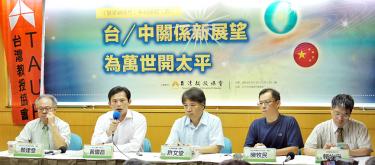Lawmakers and academics yesterday called for constitutional reform to free Taiwan from the shackles of the “one China” framework and push for “normalization” of the nation, while rejecting the feasibility of the so-called “1992 consensus” that they said has been forced upon president-elect Tsai Ing-wen (蔡英文) by Beijing and President Ma Ying-jeou (馬英九).
Amid growing pressure from China for Tsai to toe Beijing’s line, non-governmental organization the Taiwan Association of University Professors invited New Power Party (NPP) Executive Chairman Huang Kuo-chang (黃國昌) and several academics to speak at a forum in Taipei yesterday on cross-strait relations.
“When Chinese Nationalist Party [KMT] members speak of the ‘one China’ principle, they often also mention Article 11 of the Additional Articles of the Republic of China [ROC] Constitution, which was passed by the now-defunct National Assembly in 1991 and thus lacks democratic legitimacy,” Huang said at the forum.
The article in question, which applies the formula of “one country, two areas” to cross-strait relations, states: “Rights and obligations between the people of the Chinese mainland area and those of the free area [Taiwan], and the disposition of other related affairs may be specified by law.”
Huang said that based on the concept that a nation’s sovereignty rightly belongs to its people, it is self-evident that Taiwan and China are two separate sovereign nations that have simply been put in unfair circumstances.
Citing the need to “normalize” Taiwan, Huang said the goal requires collective efforts and step-by-step plans, starting with promulgation of an act governing the signing of cross-strait agreements, followed by the normalization of society, the economy and then the constitutional system.
“We should create a Taiwan-centric education system to replace the longstanding China-oriented curriculum … while bidding farewell to the nation’s authoritarian legacy. In terms of the economy, the new Democratic Progressive Party government must expand domestic demand and steer Taiwan toward the world, instead of relying solely on China,” Huang said.
He said the final step is to engineer bottom-up constitutional reform to eradicate the “one country, two areas” formula and to ensure better division of labor among different government agencies.
While putting aside a long-term dispute over the existence of the “1992 consensus,” Taiwan Thinktank deputy chief executive Lai I-chung (賴怡忠) said it is bizarre to use a “consensus” that dates back 24 years to define current cross-strait relations.
“In addition, despite Ma’s acknowledgement of the ‘1992 consensus’ over the past eight years, China has never relinquished its efforts to push for the ‘one China’ principle,” Lai said.
Past events indicated that the “consensus” is not conducive to Taiwan in terms of the economy, politics and cross-strait stability, Lai said, citing an op-ed piece published by Chinese state-run newspaper the Global Times in October 2014, which called Ma a “local chieftain,” and China’s unilateral designation of the M503 air route in January last year, despite its threat to Taiwan’s national security.
The “1992 consensus” — a term former Mainland Affairs Council chairman Su Chi (蘇起) admitted making up in 2000 — refers to a tacit understanding between the KMT and the Chinese Communist Party that both sides acknowledge there is “one China,” with each side having its own interpretation of what “China” means.
Chen Mu-min (陳牧民), chairman of the Graduate Institute of International Politics at National Chung Hsing University, said the foreign policies of both Ma and former president Chen Shui-bian (陳水扁) were a failure, with the former clinging to the illusion that cross-strait rapprochement would increase Taiwan’s international space and the latter seeking to rectify the name of Taiwan in the international arena at the cost of cross-strait ties.
“Although it would be hard for Tsai to find a middle ground between these two policies, her administration should try to create an international environment more amicable for Taiwan, increase the nation’s sway over the international community through its ‘soft power,’ and expand the international horizons of Taiwanese,” Chen Mu-min said.
Source: Taipei Times - 2016/05/16





















